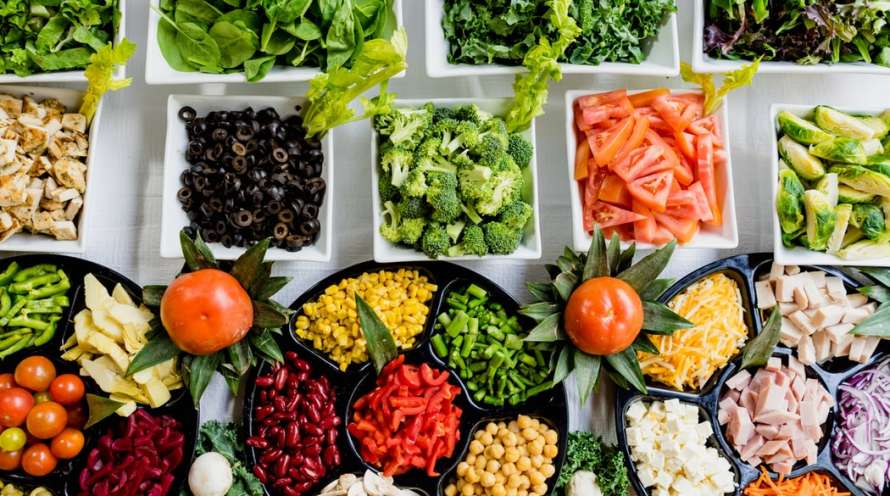The way in which we buy and store fresh food can determine how long they will remain fresh. Do you know these 5 golden rules?
Now that we have started the year with good purposes and among them improve the quality of our food, we will serve some tips to organize that fridge full of vegetables. 😉
Fresh ingredients are part of a healthy diet, so storing them correctly will be very important for them to last as long as possible in good condition.
Many times it happens to us that we go to the market and buy fresh vegetables that look in perfect condition but when we get home we do not store them in the best possible way and in 2 days we have a fridge with withered vegetables or that smells badly with too ripe fruit already rotting point.
HOW TO STORE FRUIT AND VEGETABLES TO EXTEND YOUR LIFE
Saving these fresh products properly will save us money and make it easier for us to eat healthier. So here are some recommendations.
- BUY ONLY WHAT YOU NEED
Sometimes it happens to us that we go to the fruit shop and see pieces of precious fruits and vegetables, which are in season and at a discounted price, which causes us to buy more. So rule number 1, buy only the actual amount you need for the next 2-5 days, don’t pretend that it will last you a whole week. It will only be the case of some tubers and roots that are well kept will last up to a whole month.
If you have gone through the purchase consider keeping or freezing the excess before it is damaged.
- DO NOT CUT OR FEED THE FOOD
Save the whole food. If you peel the fruit or vegetables, part of their cells break and microorganisms will begin to grow, so it is better to avoid breaking your skin and leaving the stem intact.
- BETTER WITHOUT PLASTIC
Do not store fruit and vegetables in an airtight bag, as this will speed up your wilting process.
You will want to prevent mold growth that could damage all fruits and vegetables stored in the same bag. So immediately throw away old vegetables or reuse them to make compost.
- EYE WITH ETHYLENE GAS
Make sure you store the different types of fruits and vegetables in appropriate groups. Some give off high levels of ethylene gas (a ripening agent), which causes them to mature faster and the other vegetables and fruits around them.
So store green leafy vegetables such as kale or spinach in a container, and separate them from peaches and apples, because if we mix the fruit with the vegetable, it will cause the vegetables to pass and turn yellow in 1-2 days since they are very sensitive to ethylene gas.
If on the contrary, if you need to accelerate the ripening process of a vegetable or fruit you can use this trick in your favor.
Classification of fruits and vegetables according to how we should store them:
- High content of ethylene gas and can be stored inside the refrigerator: apples, apricots, avocados, cranberries, melon, custard apples, figs, spring onion, guavas, grapes, kiwi, mangoes, nectarines, papaya, passion fruit, peaches, pears, persimmons , plums and tomatoes.
- High content of ethylene gas but should be stored in a dry and better place in the dark: potatoes, sweet potatoes and bananas.
- Very sensitive to ethylene gas, so keep them separate from foods that produce it: asparagus, green bananas (immature), blackberries, broccoli, Brussels sprouts, cabbage, carrots, cauliflower, chard, cucumber, eggplant, endive, garlic, green beans, kale, leeks, lettuce, ocher, onions, parsley, peas, peppers, raspberries, spinach, zucchini, strawberries, canons and melons.
- THE TUBES OUT OF THE FRIDGE
Store tubers and roots such as potatoes, sweet potatoes, carrots and beets in a dark, cool and dry place. This way they can endure a whole month in good condition.
Do not store potatoes in the refrigerator as they may develop more sugar content.
Finally, when making the purchase, opting for organic products whenever we can should be a preference because they have a higher nutritional value than those of conventional cultivation.
Chemical fertilizers and pesticides can destroy the earth’s nutrients, such as sulfur and chromium that are vital to our health. This was demonstrated by a study conducted by “The Organic Center” that concluded that organic foods are more nutritionally dense in 61% of cases, and that conventional foods have a higher nitrate content, a component considered hazardous to health.


